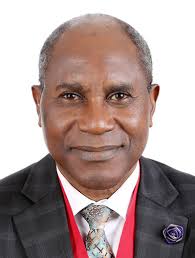2.9K
In this exclusive with Daniel Adaji of Pointblanknews, Dr. Samson Opaluwah, Chairman of the Council of Registered Builders of Nigeria, delves into the realities behind Nigeria’s housing challenges. He highlights systemic flaws in the national conversation around housing deficit, recommends holistic reforms, and calls for a grassroots-driven housing strategy.
To begin, what are the primary factors contributing to Nigeria’s housing deficit?
I’m pleased to engage with you on the matter of housing in Nigeria.
As a professional builder and civil engineer, I’ve been involved in housing delivery since 1974 — that’s over 50 years of experience. First, I must say I don’t like the term “housing deficit” without context. We must first understand what we mean by “housing” and “deficit.” Adequate housing varies across cultures and countries. What works in Dekina where I grew up in Kogi State, may differ from what’s considered adequate in Malaysia or the U.S.
For instance, growing up, my grandmother had three houses: one for residence, one for business, and one for rent. That arrangement met our needs perfectly. So, before we talk about deficit, we must assess what adequate housing means in a Nigerian context.
Secondly, the figures about our housing gap are often speculative. Thankfully, the government is planning a housing and population census, and if it’s well executed, it will help us address shortages more effectively.
Thirdly, 80% of housing shortages are concentrated in urban areas due to rural-urban migration. If we can reverse that trend by redistributing economic opportunities, the demand on urban housing will lessen. Currently, young people move to cities where jobs and prospects exist — leaving behind empty homes in villages and creating slums in the cities due to affordability constraints.
What’s your take on the increasing number of empty but expensive houses in cities?
Housing is a business. When investors build, they expect returns. If they don’t get tenants, it’s a business risk they bear — especially with high-interest rates on housing loans. Taxing empty houses is counterproductive. Instead, we need to create an investment-friendly environment. When interest rates are high and building materials are expensive, the resulting rent or sale price reflects those costs. If those homes are priced out of reach, it’s not the fault of the developer — it’s a structural issue. We shouldn’t blame investors for conditions they didn’t create.
The recent tax reform bill proposes tax relief for rental income below N10 million. Beyond that, what incentives should be introduced to support housing?
We need to review the Land Use Act to make land access easier. Every Nigerian should be entitled to a plot of land — free, just like a national ID card. That’s the starting point for equitable housing.
Next, support investors with low-cost funds and offer tax waivers, not just on rent but also to building material manufacturers. Also, we must invest in research into indigenous building systems. We’ve abandoned our traditional mud and thatch structures which, when improved upon, could offer durable, low-cost housing using locally available materials. Our minds have been colonized to believe only concrete and steel are viable, but that’s neither sustainable nor affordable for all.
There’s concern about uncompleted buildings in urban centers being used for illegal activities. How does this affect national security?
That’s a serious issue but needs ab deeper look. Many of these buildings are occupied by people who migrated from rural areas because they had no economic opportunities back home. It’s elitist to label them security risks when we’ve done nothing to address their vulnerabilities.
These people don’t want to be criminals — they are forced into unsafe spaces by economic desperation. Creating opportunities in rural areas is the only sustainable solution. You can’t solve this by rounding them up or demolishing structures — you solve it by making rural areas livable and productive.
What kind of synergy should exist between the government, private sector, and other stakeholders to solve the housing crisis?
When people say “the government can’t do it alone,” I believe they misunderstand governance. Governance includes the executive, legislature, judiciary, and the private sector. Housing delivery involves five key pillars: Access to Land; Construction Technology; Building Materials Supply; Skilled Personnel and Finance.
To address these comprehensively, all stakeholders — from policymakers to academia to financiers — must come together to create a national housing strategy. For instance, if I produce tiles locally, imported tiles are still cheaper due to lack of policy support. What incentives do I have to stay in business?
Similarly, population growth projections demand we start training artisans, architects, engineers, and builders now. Our schools must align with future manpower needs. Governance must be about planning and organizing for the future.
What is your message to Nigerians struggling with housing challenges?
Housing is a basic human need. I urge every Nigerian to reflect: Is where you live the best place for you? If not, what can you do to change it? You’re not alone. Many of us in the housing industry are advocating daily for solutions on your behalf. We haven’t given up, and neither should you. With the right leadership, planning, and commitment, we will solve this.



